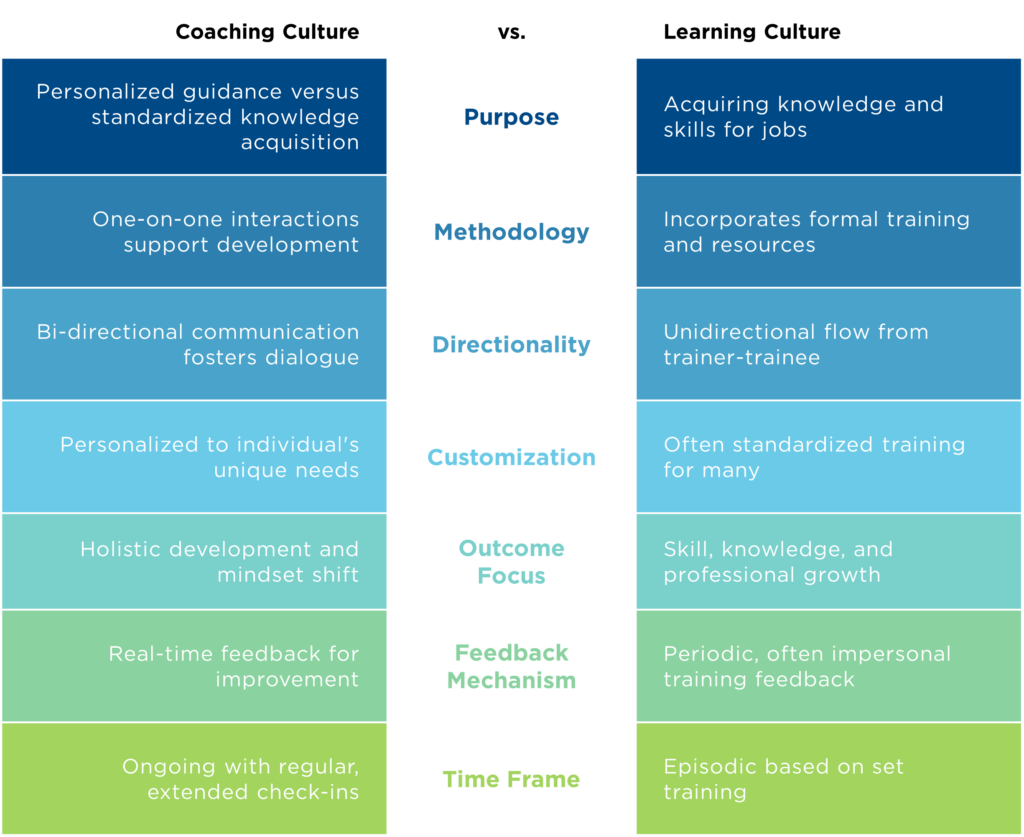In today’s ever-evolving workplace environment, the cornerstone of success is undoubtedly a resilient organizational culture. One of the most transformative aspects of this change is the emergence of a coaching culture, a setting where developmental dialogues between everyone, from leadership to newcomers, are a regular occurrence. This shift is not about directives from above or mere reactionary problem-solving; it’s about proactive growth, combined problem-solving, and a shared learning experience.
What is a Coaching Culture?
In summary, a coaching culture is an approach within organizations where coaching principles guide communication, development, and performance from leaders at all levels. Instead of just following top-down orders or traditional management styles, this culture prioritizes continuous personal and professional growth, teamwork in solving problems, and open sharing of knowledge. It ensures employees feel valued, empowered, and encourages regular feedback to make the organization more adaptable and responsive.
The importance of a coaching culture stems from its ability to nurture a growth mindset, challenging the age-old paradigm of fixed roles and responsibilities. This ethos endorses continuous evolution, adaptability, and the harnessing of collective wisdom. In essence, when organizations make the shift to a coaching model, they’re making a sound investment in a more dynamic and sustainable future.
A coaching culture and a learning culture, while complementary in many ways, have distinct characteristics that differentiate them. Here are seven key differences between the two:

While these differences exist, it’s essential to note that many successful organizations integrate both coaching and learning cultures to optimize employee development and organizational growth.
The Return on Investment
The Return on Investment (ROI) of leadership coaching can be profoundly impactful for both individuals and organizations. Leadership coaching, often viewed as an upfront expenditure, provides dividends that far surpass its initial cost. Leaders at all levels who have a coach demonstrate improved decision-making, heightened interpersonal effectiveness, and increased confidence in their roles. These individual enhancements often lead to more cohesive teams, fostering an environment where collaboration and innovation thrive.
From an organizational standpoint, the benefits manifest in the form of higher employee engagement, reduced turnover, and improved overall productivity. As leaders become more adept at navigating challenges and optimizing their leadership style, they drive operational efficiencies that can directly influence the bottom line. Moreover, a well-coached leader can instill a culture of continuous learning and development, ensuring that the organization remains adaptable and resilient in an ever-evolving business landscape. Thus, while the immediate costs of leadership coaching might be evident, the long-term returns—both tangible and intangible—justify it as a wise and strategic investment.
For individuals, being part of a coaching culture can be incredibly rewarding. Such a setting invariably leads to personal growth spurred by frequent coaching conversations, which encourage introspection. There’s a strong emphasis on continuous learning, enabling individuals to refine and master new skills. Employees feel valued and heard, giving them a sense of ownership and confidence in their roles. With a consistent feedback mechanism in place, they also find it easier to chart out their career paths.
Organizations rooted in a coaching culture are known to be agile, adapting quickly to changes by leveraging collective insights. Their performance sees marked enhancement, with teams working seamlessly, improving overall productivity. Furthermore, an environment that prioritizes growth and development tends to retain employees longer, fostering a sense of loyalty. This, in turn, nurtures potential leaders, ensuring that the organization has a constant flow of capable individuals ready to step up.
A Guide for Leaders
- For leaders aiming to foster a coaching culture, the journey might seem daunting but is rewarding. Leaders must personify the coaching spirit, actively seek feedback, and provide guidance. They must also realize that not everyone is innately skilled at coaching; hence, investment in regular training is crucial. Feedback loops should be frequent, ensuring that coaching remains an ongoing process. And every success, big or small, achieved through this approach should be celebrated, reinforcing the value of the coaching culture.
- However, introducing such a transformative change isn’t without its challenges. Leaders may encounter skepticism, which can be addressed by consistently communicating the myriad benefits of a coaching culture and showcasing tangible results. Allocating dedicated time for coaching sessions is vital to emphasize its importance. Furthermore, alignment in vision across all levels of the organization ensures that the essence of the coaching culture remains undiluted.
- Buy-in from stakeholders is pivotal for the success of this initiative. Involving everyone in the change process, sharing stories of individuals who have reaped the benefits of coaching, and equipping teams with the necessary tools can foster this buy-in.
- When seeking an external coaching organization, it’s vital for companies to consider several key factors. Firstly, there should be a clear alignment between the coaching vision and the organization’s objectives to ensure both parties are working towards the same goals. Secondly, customization is essential; every organization has unique needs, and a generic, one-size-fits-all approach is often insufficient. It’s also important to measure the tangible impact of coaching, especially in terms of competency enhancement, to assess the efficacy of the intervention. Lastly, operating within a strong ethical framework is non-negotiable, ensuring trustworthiness and credibility in all interactions.
Conclusion
In conclusion, the coaching culture is not just a passing trend but a significant shift that promises to bring out the best in organizations and their members. At bluSPARC™, we’ve seen the transformative impact of coaching firsthand. Organizations that wholeheartedly embrace this approach are gearing up for a future marked by unparalleled growth, adaptability, and success. The way forward is clear: the future of work is intertwined with coaching, and it’s high time we embraced it.


